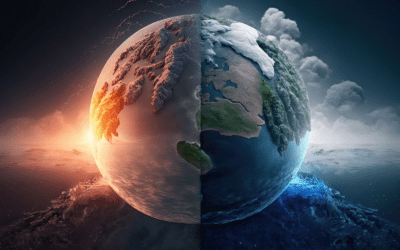by Tyler Austin Harper in The New York Times…Climate anxiety, of the sort expressed by that student, is driving new fields in psychology, experimental therapies and debates about what a recent New Yorker article called “the morality of having kids in a burning, drowning world.” Our public health infrastructure groans under the weight of a lingering pandemic while we are told to expect worse contagions to come. The near coup at OpenAI, which resulted at least in part from a dispute about whether artificial intelligence could soon threaten humanity with extinction, is only the latest example of our ballooning angst about technology overtaking us.
Rising to the occasion: Practical hope in a global polycrisis
In the New School at Commonweal video, Host Michael Lerner joins Commonweal board member Katherine Fulton in conversation with Graham Leicester, who has pioneered new ways to navigate and even thrive in this complex era.
Friction is growing
by Bill McKibben in Resilience.org…The past decade of global natural catastrophes has been the costliest ever. Warmer temperatures have made storms worse and contributed to droughts that have elevated wildfire risk. Too many new homes were built in areas at risk of fire.
The world being on fire is swelling ‘catastrophe bonds’ to a record $45 billion—and it’s a key hedge fund strategy
by SHERYL TIAN TONG LEE et al, in Fortune….“I can’t tell you if there’s going to be a hurricane or earthquake this year, obviously,” said Hagood of Nephila Capital. “But what I can tell you is spreads are near historical highs in the sector. So broadly speaking, we believe the market is being well paid for the risk.”
In “The Ministry for the Future,” new ideas from ancient wisdom
By Forrest Brown in The Long Now Foundation….When we are bound in a system of reciprocity, not return on investment, we will be closer to being the kind of ancestors future people need.
Mark Zuckerberg spent $187 million secretly buying 1,600 acres of Hawaii land, and now he is reportedly building a massive self-sustaining apocalypse bunker
by Caleb Naysmith in Yahoo Finance…Alongside the sprawling farm and ranch, the compound is being designed to be self-sustaining. From underground bunkers to its own energy and water supplies, the compound has nearly everything you would need to survive for months at a time.
Ecological ‘doom loops’ edging closer
from University of Sheffield….Extreme weather events such as wildfires and droughts will accelerate change in stressed systems leading to quicker tipping points of ecological decline, according to a new study.
‘Civilizations rise and fall’
by Evan Malmgren in Business Insider…Inside an off-grid community of families preparing for the downfall of America
It is time to tax the rich… and their foundations
by Lynn Murphy and Alnoor Ladha in Aljazeera….Philanthropic endowments are designed to protect the financial interests of the 1 percent. They should be taxed.
How to thrive in an uncertain world
by Maggie Jackson in The New York Times…Humans naturally need answers and so typically find uncertainty aversive. With a presidential election, war erupting in multiple zones, rising climate volatility and myriad other types of flux, it’s easy to feel overwhelming angst for the future and see certainty as a beacon in a darkening time.



